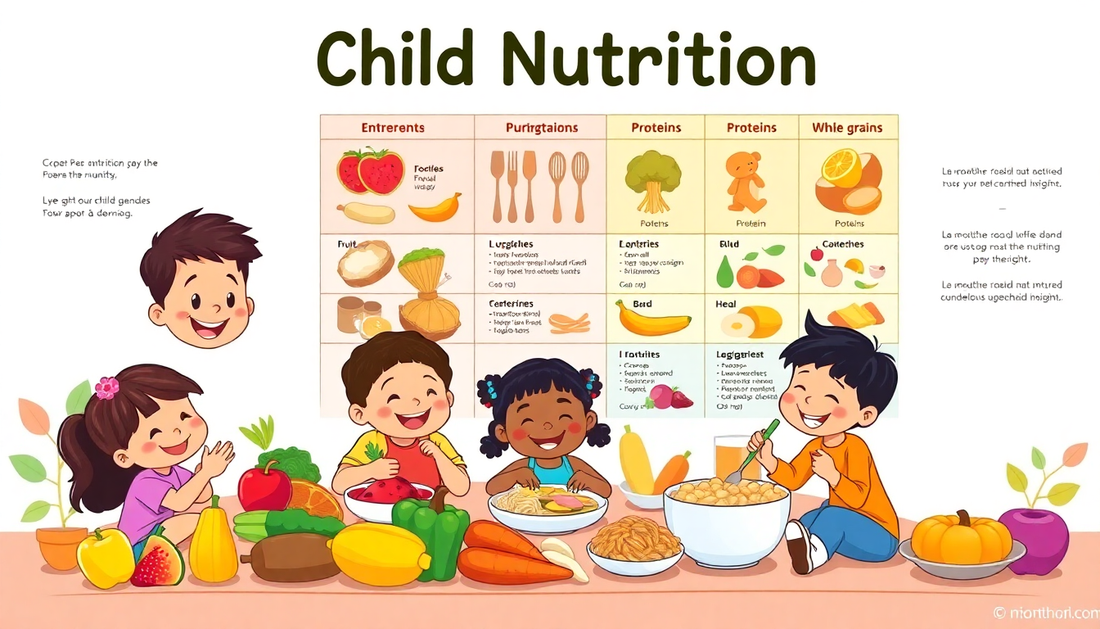
Essential Nutrients for Kids: A Comprehensive Guide to Child Nutrition (Ages 3-10)
Share
As parents, we all want to ensure our children grow up healthy and strong. Proper nutrition plays a crucial role in supporting their physical, cognitive, and immune system development during the crucial 3-10 year old stage. In this comprehensive guide, we'll explore the essential nutrients kids need, strategies for balanced meal planning, and tips to overcome common nutritional challenges.
The Importance of Proper Nutrition for Child Development
Childhood is a time of rapid growth and change. During these formative years, kids' bodies and minds are undergoing significant transformations that require a steady supply of essential vitamins, minerals, and macronutrients. When children don't get the nutrients they need, it can lead to a range of issues, from stunted growth and weakened immunity to cognitive delays and behavioral problems.
On the flip side, a nutrient-rich diet supports children in reaching key developmental milestones, maintaining a healthy weight, and building a strong foundation for lifelong wellness. By understanding the specific nutritional needs of 3-10 year olds, parents can make informed choices to optimize their child's health and set them up for success.
Critical Nutritional Components for Growing Kids
Protein for Growth and Repair
Protein is the building block of cells, tissues, and organs, making it essential for children's physical growth and development. Growing kids need more protein per pound of body weight compared to adults. Good sources include lean meats, poultry, fish, eggs, dairy, beans, lentils, and soy.
Calcium for Bone Health
Calcium is crucial for developing strong, dense bones and teeth. This mineral plays a key role in preventing conditions like osteoporosis later in life. Dairy products, leafy greens, fortified cereals, and tofu are all excellent calcium sources for kids.
Iron for Cognitive Function
Iron supports the transport of oxygen throughout the body, fueling brain activity and cognitive performance. Without enough iron, children may experience fatigue, poor concentration, and developmental delays. Red meat, poultry, beans, lentils, and iron-fortified cereals can help meet iron needs.
Vitamins A, C, and D
These essential vitamins support immune function, vision, skin health, and bone development. Vitamin A can be found in orange and yellow produce, while citrus fruits, tomatoes, and bell peppers are rich in vitamin C. Sunlight exposure and fortified dairy products or supplements provide vitamin D.
Omega-3 Fatty Acids
Omega-3s play a crucial role in brain development and function. They also help reduce inflammation, which can benefit conditions like ADHD. Fatty fish, walnuts, flaxseeds, and algae are all good sources of these healthy fats.
Immune System Support for Growing Kids
A strong immune system is key for helping children ward off common illnesses and infections. Several nutrients work together to support immune function, including:
- Vitamin C: Found in citrus fruits, bell peppers, and strawberries, vitamin C is a powerful antioxidant that boosts white blood cell production.
- Zinc: This mineral supports the growth and development of immune cells. Good sources include meat, poultry, seafood, beans, and nuts.
- Vitamin E: An antioxidant that enhances immune cell activity, vitamin E is abundant in plant oils, nuts, seeds, and leafy greens.
- Probiotics: The beneficial bacteria in the gut microbiome help regulate immune responses. Fermented foods like yogurt, kefir, and sauerkraut are natural probiotic sources.
Incorporating a variety of these immune-boosting nutrients through a balanced diet, along with targeted supplementation if needed, can help keep kids healthy and resilient.
Balanced Diet Strategies for Growing Kids
Ensuring children get all the nutrients they need can be a challenge, especially for picky eaters. Here are some tips for building a nutrient-rich diet:
Meal Planning Tips
- Focus on whole, minimally processed foods
- Include a variety of fruits, vegetables, whole grains, lean proteins, and healthy fats at each meal
- Incorporate kid-friendly nutrient-dense foods like smoothies, nut butters, and veggie-packed pasta dishes
- Avoid added sugars, sodium, and unhealthy fats as much as possible
Overcoming Picky Eating
- Expose kids to new foods repeatedly in a low-pressure environment
- Involve children in meal preparation to build interest and ownership
- Offer dips, sauces, and seasonings to make healthy foods more appealing
- Be a role model by enjoying a wide variety of nutritious foods yourself
Potential Nutrient Deficiencies and When to Seek Help
Despite our best efforts, some children may still struggle to get all the nutrients they need from food alone. Common signs of potential deficiencies include:
- Slow growth or weight gain
- Frequent illness or infections
- Fatigue, irritability, or difficulty concentrating
- Unusual food cravings
- Skin, hair, or nail changes
If you notice any of these issues, it's a good idea to consult a pediatric nutritionist or your child's doctor. They can assess your child's overall health, identify any nutrient gaps, and recommend appropriate supplementation if necessary.
Conclusion
Proper nutrition is essential for supporting the rapid physical, cognitive, and immune system development that occurs during the crucial 3-10 year old stage. By understanding the key nutrients kids need and implementing balanced diet strategies, parents can help ensure their children grow up healthy, strong, and resilient. Remember, every child is unique, so work closely with your pediatrician to find the right nutritional approach for your family.
